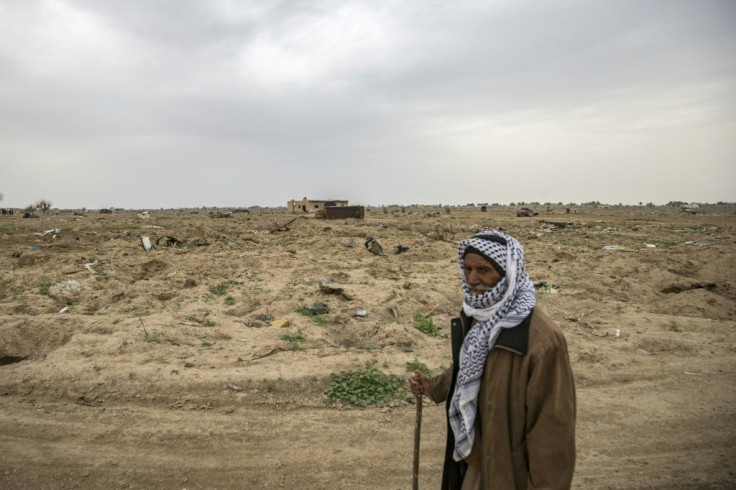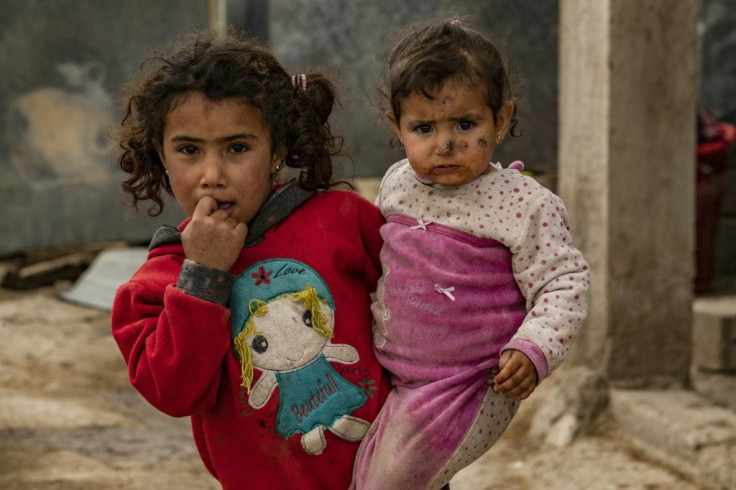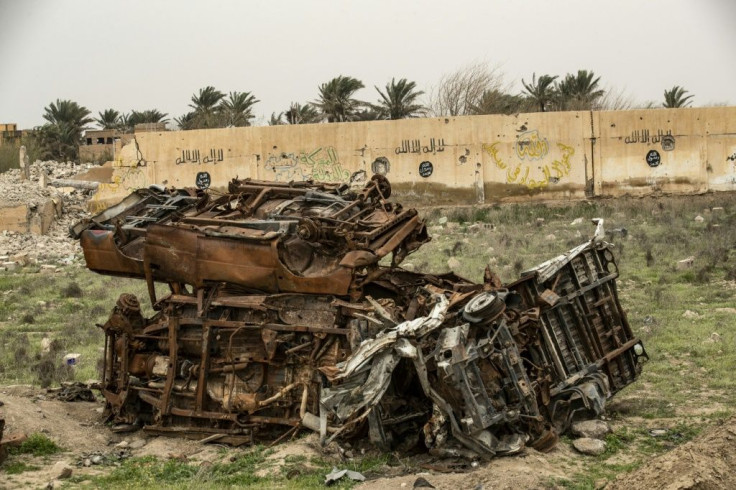Syria's Baghouz, One Year After Last IS Flag Came Down

A year after the last black flag of the Islamic State group was lowered in the Syrian village of Baghouz, local farmer Hamad al-Ibrahim is trying to restore his damaged land.
But traces of the jihadist group are still all around him in this small and remote village near the Iraqi border, where Kurdish fighters and the US-led coalition declared the IS proto-state defeated in March 2019 after a blistering months-long assault.
At the foot of a craggy hill, 75-year-old Ibrahim spots discarded explosives belts and tattered military vests crumpled in the dust.
Nearby, an empty bullet casing rusts and the mangled remains of charred vehicles dot the fields.
"We are fixing the wreckage so we can sow this land with wheat for bread," says the man who heads an extended family of 75 people.
"We want to revive this plot and plant crops we can eat," he tells AFP.
The farmer returned to Baghouz a few months ago, having fled to other parts of Deir Ezzor province and later to the northern province of Raqa as the fight against IS raged.
In a battered encampment on the edge of the village, once crammed with thousands of IS jihadists and their relatives, Ibrahim's family now works to clean up the detritus of war.
They have found landmines planted where Ibrahim hopes his wheat crops will grow and, on some occasions, weapons buried beneath the ground.
"When we came back and saw what had happened to our land, my son was going to go mad. I was scared he was going to have a stroke," Ibrahim says.
"This wreckage feels like a wound in my body."

The churned-up wasteland Ibrahim must now tend to is all that remains of the cross-border proto-state that the extremist group declared in 2014 across large swathes of Syria and neighbouring Iraq.
At its height, the group inflicted its brutal interpretation of religion on some seven million people and launched deadly attacks against the West.
While the so-called caliphate is now dead, fears of attacks by IS remnants are still very much alive among residents and Kurdish-led security forces.
At the entrance to Baghouz, fighters of the Syrian Democratic Forces verify identity papers and conduct foot patrols at strategic points.
A spokesman for the Deir Ezzor Military Council, a body affiliated with the SDF, says Baghouz is secure, but IS cells "continue to operate in nearby villages such as al-Shaafa and al-Sousa."
Despite the defeat in Baghouz, IS has maintained a presence in SDF-held areas, where it claims near-daily attacks.

The Kurdish-led fighters and their coalition allies have since last year been on the hunt for such jihadist remnants.
In October, a US raid in northern Syria killed IS leader Abu Bakr al-Baghdadi, before the group announced his successor as Abu Ibrahim al-Hashimi al-Quraishi.
But Baghdadi's killing has only spurred more sleeper cells into action, says the spokesman for the Deir Ezzor Military Council, who asked to be identified as Haroun.
"IS is seeking revenge," he tells AFP.
Despite the looming threat of attacks, half of Baghouz's residents have returned in recent months, bringing a semblance of normal life with them.
In the main market, women clad from head to toe in black stroll along the street, IS insignia still painted on surrounding walls.
Vendors sell fruit and vegetables from small roadside carts beneath listing balconies.
Many war-battered apartment blocks are abandoned, while those inhabited lack running water and electricity.
Amid the devastation, an outbreak of leishmaniasis -- a skin disease caused by a microscopic parasite spread by sandflies -- has gripped the village.
The illness is endemic in Syria but has become more prevalent during the nine-year civil war, especially in areas rocked in recent years by clashes to expel IS jihadists.
Baking flatbread on a rudimentary stove, Faten al-Hassan says the outbreak of the disfiguring disease in Baghouz is significant.
"All my kids have leishmaniasis, and it's not just them. Most residents suffer from this illness too," the 37-year-old tells AFP.
But at least, "we are living inside our home, and for now, this is enough," she adds.
Nearby, Hashem Raafat, 20, is not as lucky.
Living in a tent near his bombed-out house, he says: "Public services are non-existent, houses are destroyed, and many have died because of landmines while we don't have a single hospital."
"We are living in hell."
© Copyright AFP 2024. All rights reserved.





















